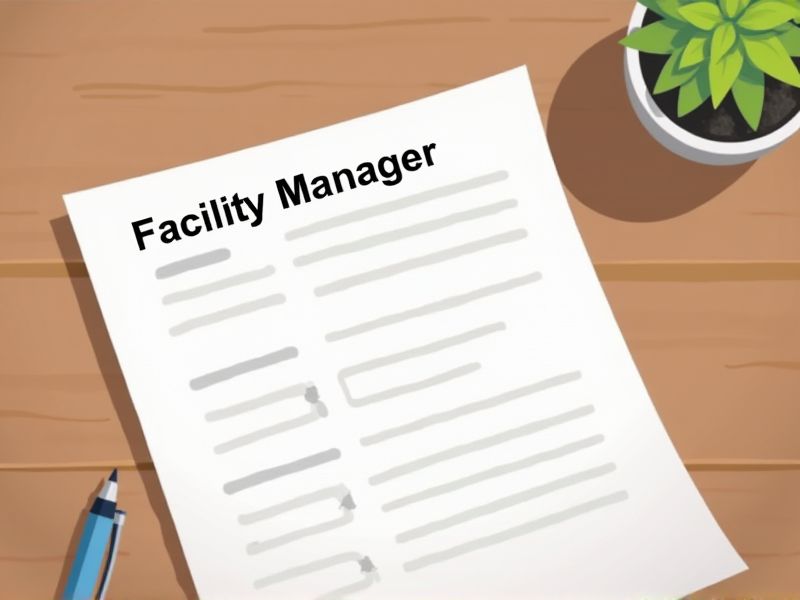
Facility managers play a pivotal role in ensuring that buildings and infrastructure operate efficiently, which directly impacts organizational productivity and safety. Certifications enhance their expertise in various disciplines, such as sustainability, safety, and operational efficiency, making them indispensable. With certified skills, facility managers are better equipped to handle complex challenges, adhere to industry standards, and implement best practices. Here are several key certifications that can be valuable for facility managers.
Certified Facility Manager (CFM)
Certified Facility Manager (CFM) credentials validate a professional's expertise, signaling proficiency in handling complex facility challenges. Employers tend to trust CFMs with broader responsibilities, leading to increased job opportunities and career advancement. The certification process equips managers with up-to-date knowledge on sustainability, maintenance, and operational efficiency. Industry demands for consistent and high-quality facility management practices make CFM a benchmark for standardized performance.
Facility Management Professional (FMP)
Facility Management Professionals bring specialized knowledge, enhancing the operational efficiency of a facility. Certification in FMP often leads to improved risk management and regulatory compliance, which can reduce liabilities. Trained FMPs use data-driven approaches to optimize facility budgets and resource allocation. Their expertise aids in implementing sustainable practices, contributing to long-term cost savings and environmental responsibility.
Sustainability Facility Professional (SFP)
Facility managers face increasing pressure to implement sustainable practices due to regulatory and environmental standards. An SFP credential equips them with the necessary knowledge and tools to integrate sustainability into facility operations effectively. This expertise can lead to cost savings through energy efficiency and waste reduction initiatives. Having an SFP-certified manager enhances an organization's reputation and complies with evolving market demands for sustainable operations.
Certified Maintenance & Reliability Professional (CMRP)
The CMRP certification equips facility managers with specialized knowledge in asset management and preventive maintenance strategies, leading to reduced operational downtime. By holding a CMRP credential, facility managers signal competence in reliability best practices, attracting higher project investment and stakeholder trust. Data indicates that certified professionals often contribute to lower maintenance costs, increasing overall facility profitability. The global recognition of CMRP enhances career mobility and opportunities for advancement within the maintenance and reliability sector.
Certified Energy Manager (CEM)
Facility Managers increasingly rely on Certified Energy Managers to optimize energy consumption, as this contributes to cost reduction and improved building performance. A CEM possesses the expertise to assess and enhance energy efficiency, which helps facilities meet sustainability goals and comply with regulations. By identifying energy-saving opportunities, CEMs support Facility Managers in implementing strategies that reduce environmental impact. Access to specialized knowledge and tools ensures energy-related decisions are grounded in the latest industry standards and innovations.
Leadership in Energy and Environmental Design Accredited Professional (LEED AP)
LEED AP credential provides facility managers with a comprehensive understanding of sustainable building practices, which enhances their capability to implement environmentally efficient systems. Implementing LEED standards can lead to reduced operational costs, as energy-efficient buildings typically consume less energy and water. Facilities managed by LEED APs often see increased property values and attract environmentally conscious tenants, contributing to higher occupancy rates. Ensuring a building meets LEED criteria can also reduce regulatory risks, aligning with local government initiatives for sustainability.
Project Management Professional (PMP)
A Facility Manager who earns the Project Management Professional (PMP) certification gains a structured skill set for managing complex projects efficiently, leading to improved project outcomes. This certification ensures the Facility Manager is equipped with globally-recognized best practices, enhancing their ability to handle the planning, execution, and closing of facilities projects. With PMP-certified Facility Managers, organizations often experience reduced project risks and better resource management. Companies increasingly seek professionals with PMP credentials to maintain competitive advantage and meet industry standards effectively.
OSHA 30-Hour General Industry Certification
The OSHA 30-Hour General Industry Certification provides facility managers with extensive knowledge of workplace safety standards, reducing the risk of on-site accidents. With increased awareness of OSHA regulations, managers can ensure compliance, avoiding legal penalties or fines for the facility. Enhanced training in hazard identification and control strategies enables facility managers to create safer work environments. This certification leads to improved worker safety culture, enhancing productivity and reducing costs associated with workplace injuries.
Certified Property Manager (CPM)
Hiring a Certified Property Manager (CPM) increases the credibility and trustworthiness of a Facility Manager, assuring stakeholders of their professional competence. CPMs possess specialized knowledge in financial management and asset enhancement, essential for efficient facility operations. The designation implies adherence to strict ethical standards, reducing risks associated with mismanagement. With strategic skills in optimizing property value, CPMs contribute to the long-term sustainability of facility assets.
ISO 41001 Facility Management Systems Auditor Certification
Earning an ISO 41001 Facility Management Systems Auditor Certification equips facility managers with a standardized approach to improve operational efficiency and align with international best practices. This certification enhances credibility, ensuring stakeholders that the facility manager possesses the necessary skills to optimize resource management and maintenance processes. Organizations often choose certified professionals to minimize operational risks and ensure compliance with regulatory standards. The certification also facilitates continuous improvement in service delivery, ensuring the facility evolves to meet changing business needs.
Summary
When you obtain certifications as a Facility Manager, your skill set becomes more recognized and validated, enhancing credibility in your role. This recognition can lead to increased job opportunities and higher salary prospects within the industry. Employers often value certified professionals, who are often perceived as more efficient and knowledgeable. Consequently, organizations can see improved facility operations and reduced operational costs.
